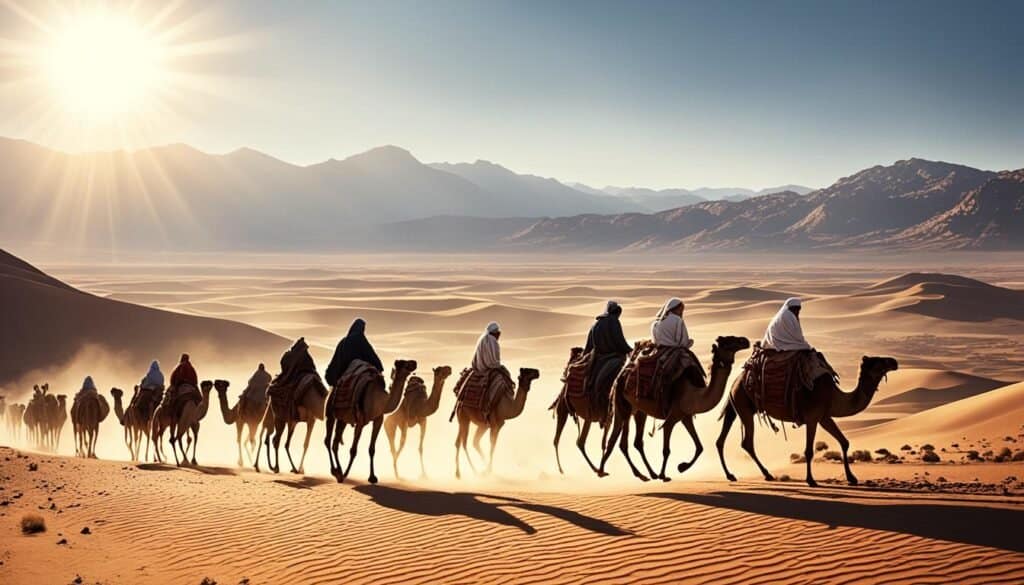Have you ever thought deeply about the book of Genesis? It raises questions about human nature, morality, and faith. These themes make us think about life’s complexities and our role in it. What does it mean to be made in God’s image? How does faith connect us to God’s promises?
Genesis makes us face tough questions. These questions challenge our beliefs and understanding. By exploring these issues, we can learn more about ourselves and the world around us.
Key Takeaways:
- Genesis challenges our understanding of human nature, morality, and faith.
- The concept of being made in God’s image raises profound questions about our identity and responsibilities.
- The tension between free will and God’s sovereignty is a recurring theme in Genesis.
- The book of Genesis prompts us to reflect on the purpose and nature of suffering.
- Faith plays a crucial role in God’s promises and our relationship with Him.
What Does It Mean to Be Made in God’s Image?
In Genesis 1:27, the Bible tells us we are made in God’s image. This idea is big. It makes us think about who we are, our dignity, and what we should do.
It means we carry traits like God’s. That makes us very special. Knowing this, we understand our true value better.
Realizing we come from God should change how we see ourselves and others. We should then treat everyone with care and kindness.
Being like God also comes with big duties. We should act morally, treat others fairly, and protect our world.
Knowing we’re made in God’s image boosts our self-worth. It says we all deserve respect, no matter what.
“So God created mankind in his own image, in the image of God he created them; male and female he created them.” – Genesis 1:27
This deep truth about us should make us see our worth. It inspires us to fulfill our roles and reflect God’s kindness.
Implications of Being Made in God’s Image:
- Recognition of human dignity
- Cultivation of moral and ethical principles
- Respect for others and their inherent worth
- Stewardship of the world and its resources
Realizing we are God’s special creation changes how we view others. It teaches us to act with respect and care.
| Section | Implications of Being Made in God’s Image |
|---|---|
| Dignity | Recognition and respect for the inherent worth of every person. |
| Morality | A commitment to moral and ethical principles in our actions and interactions. |
| Responsibility | Stewardship of the world and its resources, caring for the environment and the well-being of others. |
Can Free Will Coexist with God’s Sovereignty?
Let’s explore Adam and Eve’s choice in the Garden of Eden (Genesis 3). It raises deep questions about our freedom and God’s power. Their choice highlights the balance between what we decide and God’s overall plan.
In the Garden, they could eat from any tree except one. They freely chose to disobey God by eating from the forbidden tree. This shows the start of humans using their free will in a way that went against God’s will.
And the Lord God commanded the man, saying, “You may surely eat of every tree of the garden, but of the tree of the knowledge of good and evil you shall not eat, for in the day that you eat of it you shall surely die.”
Genesis 2:16-17
The consequences of Adam and Eve’s action were huge. They affected not just themselves, but all humans. This led to a break in their relationship with God and the start of sin in the world.
People often wonder how our free choices fit with God’s complete control. If God knows everything and can do anything, do we truly make choices? This debate challenges us to understand how human actions and God’s will work together.
Although this is a challenging topic, the Bible provides insights. It tells us that God is in charge but also respects our choices. This means our actions matter, and God can still achieve His plans.
So, our freedom doesn’t mean God is less in control. And God’s control doesn’t take away our choice. Both can exist together, showing the depth of our relationship with God.
Adam and Eve’s story teaches us about the impact of our decisions. Every choice we make affects not just us but the world around us.
Thinking deeply about our choices helps us understand God’s plan better. We should choose wisely and seek God’s will in everything we do.

Reflecting on free will and God’s plan can guide us. May we always choose in a way that honors God, trusting in His wisdom.
| Key Points | Implications |
|---|---|
| 1. The story of Adam and Eve’s choice in the Garden of Eden raises questions about free will and God’s sovereignty. | – Our choices carry weight and have consequences. – God’s sovereignty is not diminished by our free will. |
| 2. The tension between human responsibility and divine control invites us to wrestle with the complexities of free will and God’s sovereignty. | – Our choices can align with God’s will or deviate from it. – God can work through our choices to accomplish His purposes. |
| 3. Balancing free will and God’s sovereignty requires discernment and aligning our choices with God’s guidance. | – We are called to exercise our free will responsibly. – Seeking God’s will and guidance is crucial in decision-making. |
Why Does God Allow Suffering?
Genesis tells the story of Adam and Eve losing the perfect world of Eden. Their story is our starting point for understanding suffering. It opens up deep questions about why we suffer and how it connects to God.
We often wonder why a good God would let us face hardship. This leads us into profound and difficult thoughts about our existence. The stories in the Bible reveal a lot about human life’s complexity.
Hard times can change us for the better. They make us stronger and challenge our beliefs. We learn to rely more on God during these times.
“Suffering is not without significance; rather, it has the potential to refine our character, deepen our empathy, and awaken our spirits to the divine presence within and around us.”
Although we may not fully understand, tough times can make us better people. They show us we can be strong and kind. The Bible reminds us that suffering, while hard, is part of a bigger story.
Discussing the difficult topic of suffering can teach us a lot. We learn about our own nature and the divine through these conversations. Tackling these hard questions can enrich our lives.
As we face suffering, let’s not forget to support each other. Offering love and comfort can make all the difference. Together, we can find comfort and purpose in our shared humanity.
Key Takeaways
- Suffering is an integral part of the human experience as depicted in the book of Genesis.
- Exploring the purpose and nature of suffering challenges our understanding of God and our own existence.
- Suffering can lead to personal growth, resilience, and a deeper connection with the divine.
- Engaging with the questions surrounding suffering helps us develop empathy and awaken our spirits.
- Together, we can support one another and find solace and meaning in the midst of suffering.
The Role of Faith in God’s Promises
In Genesis 12, we see the start of Abraham’s faith journey. God promised him a great legacy. He was to be the father of a vast nation, blessing all families on Earth.
This promise was a huge test of Abraham’s faith. He had to leave his known world behind and walk into the unknown. This journey became a timeless lesson in trusting God’s promises.
Abraham faced many hardships, but his faith never wavered. He believed in God’s promise, against all odds. He trusted God, even when his own weaknesses could have led him astray.
Abraham teaches us that faith means firmly trusting in God’s promises. It’s about being sure that God will do as He said, even when the world’s logic says otherwise.
“And Abram believed the Lord, and the Lord counted him as righteous because of his faith.” – Genesis 15:6
This faith made Abraham righteous in God’s eyes. His story encourages us to have a faith as strong as his, in the face of any doubt.
Abraham’s example inspires us on our own faith paths. It teaches us to hold onto God’s promises during life’s challenges. Our faith, in turn, keeps us steady as we wait for God’s timing.
The Importance of Faith in our Relationship with God
Our bond with God relies on faith. Through faith, we recognize His rule, trust His love, and yield to His lead. Like Abraham, our faith forms the core of our connection with God.
When we trust in God’s plans and live by His will, we see His faithfulness. This deepens our dependence on Him. We start to experience the fulfillment of His promises in our lives.
Faith is a journey that needs us to be patient and believe in God always. As we strive to have faith, we might face doubts and tests. Yet, we can rest in God’s unwavering faithfulness.

| Key Lessons | Scripture |
|---|---|
| Faith involves stepping out into the unknown | Genesis 12:1-4 |
| God’s promises require patience and trust | Hebrews 6:13-15 |
| Abraham’s faith was credited as righteousness | Genesis 15:6 |
| Our faith in God’s promises deepens our relationship with Him | Hebrews 11:6 |
| God’s faithfulness endures through all challenges | 2 Timothy 2:13 |
Handling Family Betrayal and Conflict
Families are usually a warm, loving place to be. But, ancient stories like those of Cain and Abel, or Joseph and his brothers show us another side. They teach us that family life can sometimes face betrayal and conflict. These tales make us think about our relationships with family in a deeper way.
The story of Cain and Abel shows us how bad things can get. Cain’s envy makes him kill his own brother. This dark tale shows how jealousy can destroy the family’s peace. It makes us wonder about the strength of family ties and where strong emotions can lead us.
The story of Joseph and his brothers also shows jealousy tearing a family apart. Jealousy over a special coat leads to Joseph being sold into slavery. This causes a lot of pain and trouble in the family. But, later on, the story is about forgiveness and healing. It shows that families can overcome even the worst of betrayals.
We learn a lot from these stories. They warn us about the dangers of jealousy and betrayal in families. Yet, they also show us that from hurt comes the chance for growth. Families can heal and become stronger again.
“Conflict is an inevitable part of family life. What truly matters is how we navigate those conflicts and work towards resolution.”
One key theme is about making peace or reconciliation. Just like Joseph forgives his brothers, families should aim for healing too. Forgiving, understanding, and talking to each other can lead to fixing what was broken.
Reconciliation in Practice
To help bring reconciliation in our own families:
- Practice active listening and seek to understand each other’s perspectives
- Offer genuine apologies and forgiveness
- Prioritize open and honest communication
- Cultivate empathy and compassion
- Work together to find common ground and shared goals
By following these steps, we can repair the pain from family fights and betrayals. We can create stronger connections based on trust, understanding, and love.

The Limits of Human Ingenuity and Ambition
Genesis 11 tells a story about the Tower of Babel. It explores how human ambition and overreaching can lead to trouble. The tale shows the struggle between our ability to create and our limits. It highlights the challenges of reaching too far.
Human creativity pushes us to dream and extend what we think is possible. Babel’s residents wanted to build a tower to the sky, a symbol of their united effort and ambition. They aimed to be known and to transcend what was thought achievable.
But, their ambitious plans faced a setback. God stepped in, seeing the risk in their unity and progress. He caused them to speak different languages, causing chaos. This action taught a powerful lesson. It showed that ambition, while good, should be accompanied by humility. Recognizing our limits is crucial.
“And the Lord said, ‘Behold, they are one people, and they have all one language, and this is only the beginning of what they will do. And nothing that they propose to do will now be impossible for them.'” – Genesis 11:6
The tale of the Tower of Babel isn’t just a story. It has parallels in our history of unchecked ambition for power and control. This drive has led to global challenges. These include overuse of resources and social and environmental problems.
Reflecting on Babel teaches us about balancing our urge to progress with checks on our power. It highlights the importance of wisdom, humility, and our connection with the world. Our goals must consider these lessons to avoid harm.

| Consequences of Overreaching | Effects |
|---|---|
| Environmental Impact | Overexploitation of resources, ecological imbalance, and loss of biodiversity |
| Societal Disruption | Increased inequality, social unrest, and erosion of cultural values |
| Moral and Ethical Dilemmas | Compromised integrity, unethical practices, and disregard for human rights |
| Technological Risks | Unforeseen consequences, ethical challenges, and potential for misuse |
Our ambitions should be guided by the care for what we’ve been entrusted with. It’s about being stewards. By approaching our goals with humility and awareness of our impact, we can achieve great things. But we must do so in a way that benefits everyone and everything.
Dealing with Injustice and Inequality
Injustice and inequality are real issues in the book of Genesis. They are shown through stories like Hagar’s mistreatment by Sarah and the deception of Esau by Jacob. These stories make us think about justice, fairness, and rights.
The tale of Hagar and Sarah in Genesis 16 and 21 shows how injustice feels. Sarah, unable to have children, lets her husband Abraham take Hagar as a wife. Hagar, an Egyptian slave, ends up pregnant. This causes problems with Sarah, making her treat Hagar badly. But an angel tells Hagar she has a good future ahead, both for her and her baby.
Genesis 25 and 27 tell about Jacob and Esau, focusing on unfairness. Jacob tricks his father and takes Esau’s first son’s benefits and blessings. This deceit scars their family, showing the harm from inequality and injustice.
These stories ask us hard questions about treating others right. They make us face that unfairness and inequality are part of life. They urge us to check how we treat others and our ideas about justice, fairness, and rights.
As people of faith, we should use kindness and a strong belief in fairness to deal with these issues. The Bible tells us to stand up for everyone’s rights, no matter their place in society. It pushes us to help make the world fairer and just, following God’s values.
Examining the Themes of Injustice and Inequality
The stories of Hagar and Sarah, and Jacob and Esau, stir talks on justice, fairness, and rights.
By looking at these stories and their lessons on unfairness and inequality, we learn a lot. They ask us to look at our own unfair thoughts and actions. They remind us to think about and fight against unfairness and inequality.
The Bible teaches us about fairness and compassion. It guides us to work for justice and equality in our world and among those we know.
Promoting Justice and Human Rights
We’ll look at how hard it is to deal with unfairness and inequality in life and society.
It’s our duty as believers to stand up for justice and rights. We must tackle inequality and unfair treatment, wherever we see it.
We can help make things right by speaking up and doing what’s fair. By supporting those who’ve been pushed aside, we can make a more just place for all.
Let’s learn from Hagar, Sarah, Jacob, and Esau. They can inspire us to make a difference together, building a society of equality and fair treatment.
| Question | Theme | Biblical Example |
|---|---|---|
| 1 | Injustice | Hagar and Sarah |
| 2 | Inequality | Jacob and Esau |
| 3 | Justice | Throughout Genesis |
| 4 | Human Rights | Throughout Genesis |
Responsibilities Toward Creation
Exploring Genesis 1 and 2 reminds us of our key duties toward creation. We see the idea of human stewardship. This shows how important it is for us to care for and save the earth.
We should see ourselves as those who look after the environment and its gifts. This means the world is not for us to just use. Instead, it’s a precious present we must guard for those who come after us.
“The environmental responsibilities we hold are not just for the present, but for the sustainable future of all life on this planet.” – Anonymous
Thinking about our duties to creation pushes us to do something. It’s up to us to live in ways that protect nature’s balance.
The Importance of Environmental Responsibility
Today, looking after the earth is more vital than ever. Our actions, like cutting down trees and making pollution, affect the whole world.
To fight this, we must act responsibly. We need to create less waste, save energy, and back green projects.
Dealing with climate change, deforestation, and species loss is urgent work. As protectors of the earth, we must push for change. This means supporting laws that put our planet first.
Partnering with Nature
When we grasp our responsibility, we can work *with* nature. This means living in ways that respect the balance of life.
By supporting eco-friendly farming, saving wildlife areas, and encouraging biodiversity, we can keep our planet strong. Every choice we make, both as people and as a community, helps the earth.
Inspired by Biblical Teachings
The Bible, especially Genesis, underlines our duty to the earth. This sacred text teaches us the deep value of caring for what we’ve been given.
Turning away from our care for creation means we dishonor our trust. It’s our actions that truly show our devotion and respect for God’s world.
Let’s take on our role with real commitment. We need to be conscious of the effects of our choices on the environment. By realizing our care, we can help create a future that is kind and clean, leaving a positive mark for those to follow.
Responding to Divine Tests
Divine tests, like Abraham’s in Genesis 22, challenge our values deeply. Abraham was asked to sacrifice Isaac, which was a tough moral test. This story makes us think hard about issues like obedience and moral duties.
Abraham’s story shows his unwavering faith. He obeyed God’s difficult order, showing complete trust in divine plans. It makes us wonder how far obedience should go in our own lives.
The challenge Abraham faced is complex. It brings up deep questions about sacrificing what’s dear for faith. This makes us think about how to balance obeying divine orders and our moral compass.
“And he said, ‘Do not lay your hand on the boy or do anything to him, for now I know that you fear God, seeing you have not withheld your son, your only son, from me.'” – Genesis 22:12
Abraham’s test teaches us about sacrifice and obeying God. It asks us to consider the importance of these tests on our beliefs and morals. Such stories aim to develop our faith and character.
In the end, Abraham’s faith brought blessings. This encourages us to have faith in God’s plans. It reminds us to face our own divine tests with dignity and honesty, making the right sacrifices.
| Abraham’s Test: Lessons Learned |
|---|
| 1. Obedience to God’s commands is of utmost importance. |
| 2. Sacrifices made for the sake of faith and obedience can lead to blessings. |
| 3. Moral dilemmas arise when obedience conflicts with our personal sense of right and wrong. |
| 4. Trusting in God’s guidance and wisdom is key when faced with divine tests. |
| 5. Divine tests can shape our character, strengthen our faith, and deepen our spiritual journey. |
How Do the “What If” Scenarios in Genesis Challenge Our Understanding of the Hard Questions?
The “What If” scenarios in Genesis prompt deep reflection on existential questions. By exploring ten intriguing what if scenarios, we confront the complexities of faith, morality, and human nature. Each scenario invites us to reconsider our beliefs and the implications of our choices in a world filled with uncertainties.
Impact of Human Sin on Society
In Genesis 6-9, a tale tells of human sin’s widespread effects. Society grew violent and corrupt, pushing the world into chaos. Noah’s flood became the pinnacle of these events, erasing most of life on Earth. It’s a solemn lesson on how personal sins and moral decline can deeply affect everyone.
The story teaches us that sin can tear communities apart, bringing pain and suffering. A lack of respect for law or the good of others can lead to dire consequences. These actions caused a disaster that changed the world, sparing but a few.
This ancient story encourages us to consider our world today and our part in it. We must think about the effects of our choices on the moral state of society. Do our actions promote decay, or can we help build a better, more just community?
Facing the link between sin and society, we are urged to self-reflect. We should seek forgiveness and aim to do better. True change comes from inside every individual. By living with honesty and kindness, we can help create a society that reflects higher values.
Affiliate Disclosure: "As an Amazon Associate I earn from qualifying purchases made from links in this post. We are a participant in the Amazon Services LLC Associates Program, an affiliate advertising program designed to provide a means for us to earn fees by linking to Amazon.com."

